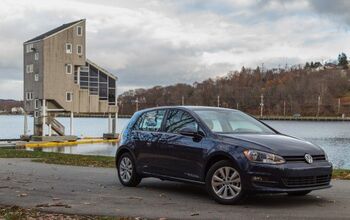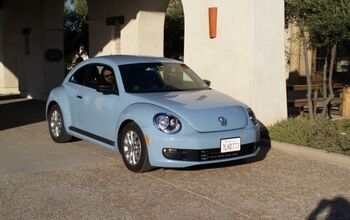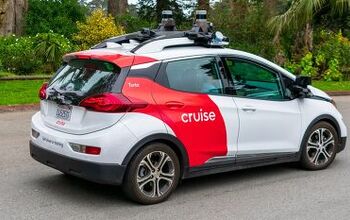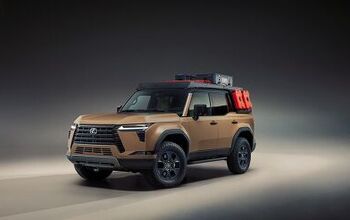Capsule Review: 2015 Volkswagen Golf 1.8 TSI Manual
13 years ago, the Golf-based Volkswagen GTI produced 180 horsepower from a 1.8L turbocharged four-cylinder powerplant. Over the last week, I’ve been driving a brand new Golf that’s also fitted with a 1.8L turbocharged four-cylinder. It generates 170 horsepower.
In 2002, you could pair Volkswagen’s 1.8T with a 6-speed manual transmission. Our test car used a 5-speed manual.
Is this progress? Strangely, yes.
To begin with, the horsepower comparison is deceiving. The new car makes way more torque: 185 lb-ft at 1600 rpm compared with 173 lb-ft at 1950 rpm. There’s also progress in the form of efficiency: It travels 25% farther on a gallon of fuel, according to EPA testing procedures. On regular fuel. The old car drank premium.
Though it’s not a spec-sheet superstar, the new 1.8T is still a very quick car when mated to the 5-speed manual. And though the transmission would surely benefit from a tall sixth gear and feels as though it could use more tightly spaced ratios, shift quality is excellent. The clutch is friendly, with no learning curve required.
Over the course of a decade and multiple generations, the Golf has made gains. Not in terms of outright power, but in overall refinement and the quality of the driving experience. These upgrades are unlikely to change the fact that most American small car buyers won’t consider a Golf. Like the well-behaved child who always carries his dishes back to the sink with two hands and efficiently and correctly finishes his homework, but who still sees all his parents’ attention paid to his delinquent little brother, der neue base Golf does its level best but still isn’t as desirable as its siblings.
This four-door, manual-shift Golf, loaned to us for a week-long visit by Volkswagen Canada, would carry a USD base price of $21,515, delivery included. As a mid-grade Comfortline example with one option package, this Golf featured a sunroof, leatherette upholstery, and dual-zone climate control. Absent the optional Fender system, audio quality was still more than acceptable. Volkswagen’s 2.0L turbodiesel adds $1300 or less to the cost in the United States. In Canada, where the price of diesel fuel is more closely comparable to the price of regular gasoline, it’s a $2500 upcharge.
With fuzzy carpeting spread across the front doors’ storage compartments and a dash covered in material so squeezable I expected fruit juice to come pouring out, there’s no doubt that the Golf’s perceived quality quotient tops the class. The infotainment system, on the other hand, lags — both in actual use and behind the segment leaders like Mazda Connect. It’s not a terrible system to use – I liked how it allowed me to scroll through satellite radio stations without actually selecting one – but the graphics and operational speed are behind the times. The 5.8-inch screen also seems too small for a proper backup camera, or is it just that the camera isn’t a particularly good one, washed out as it was in daylight and too dim later in the day?
Comfort is a key Golf edge, with first-rate seats and a huge range of adjustment for both seats and steering wheel. Wind and road noise is just something the owners of other small cars encounter; the Golf offers a proper luxury car ambience, only decontented.
Rear seat space doesn’t impress, however, as the placement of the especially narrow Diono Radian RXT carseat in the middle position required adults alongside to slam the door directly into their hip. Sure, it’s a small car, but many small cars these days offer more usable interior width. Hatchback versions of the Hyundai Elantra, Mazda 3, and Subaru Impreza all have more overall space for humans.
The Golf does possess a bit more space behind the rear seat than the 3 and Impreza, however, and the cargo area is shaped like a box with little intrusion. Seats-down capacity beats the Elantra, as well. Of course, all are surprisingly practical cars, yet they also help to clarify the appeal of small crossovers, as our Baby Jogger Summit X3 needed its wheels removed if it was to fit under the cargo cover in the Golf. Where’s the Golf R wagon when you need it?
Like virtually all continuing nameplates, the Golf has certainly grown over the span of generations. This Mk7 car is 167.5 inches long on a wheelbase of 103.8 inches; 2.6 inches longer than the Mk4 car we mentioned earlier with a wheelbase that’s been stretched nearly five inches. Yet the growth has been contained. Relative to modern machines, the current Golf is just under two feet shorter than a new Toyota Camry and just 7.5 inches longer than the 2015 Honda Fit. It’s 14.7 inches shorter than the latest Jetta, with slightly less wheelbase and slightly greater width.
Those tidy dimensions are central to the Golf’s on-road appeal. It’s as tossable as a properly set-up subcompact but as unflustered as a much larger car. Mid-corner pavement protrusions don’t bother the Golf even when you’re driving as enthusiastically as you might in its GTI sibling. The Golf’s brake pedal could be firmed up, but the weight of other controls is in keeping with the car’s mission. It’s not a hot hatch, but there’s no mistaking this ordinary Golf (on unaggressive 205/55R16 Continental ContiProContacts) for anything other than the foundation of a great hot hatch. With quicker turn in, sharper throttle response, and just a little more stiffness in the suspension, it would be a wonderful all-rounder. It is not crying out for more torque.
A Mazda 3 offers much of the Golf’s driving appeal but lacks its hushed cabin and always-serene ride quality. Subaru’s Impreza does not come close to matching the Golf’s upmarket interior but offers Vermont’s favourite all-wheel-drive system. It’s obviously difficult for the Golf to match the value and content of the Hyundai Elantra GT and Kia Forte5, but the driving experiences between those cars and the remarkable Golf are worlds apart.
Over the course of the last ten months – but not in the last two – the Golf lineup has been outsold in the U.S. by its own offspring, the GTI. With the Mk7 now widely available, the non-GTI/R/E Golf lineup doubled its U.S. October volume. Yet at 2351 units, it was by no means a popular car in America. According to HybridCars.com, diesels account for 41% of the non-GTI Golfs sold this year. The Golf family is Germany’s best-selling vehicle line, the UK’s fourth-best-selling vehicle, and Canada’s tenth-best-selling car in October.
Aside from a frumpy radio and a sunroof visor which crudely slides back and forth, the Golf is an impressive piece, not just lacking in glaring faults but full of admirable elements. One might wonder why Americans are so indifferent, until one realizes that this compact hatch costs about as much as a base Camry. The Golf 1.8 TSI is a car I want, it’s just not a car I want to pay for, not with these interior dimensions and not on this continent. Not when this car travelled 28 miles per gallon in a mix of city and highway driving while the last Golf TDI we tested did 41.
Oh, summon a little compassion for the well-behaved gas-fired Golf. Even when reviewed positively, the whole story deteriorates into praise of its oil-burning sibling. We might as well pile on by mentioning the superior styling of the Mk1’s round headlights.
Timothy Cain is the founder of GoodCarBadCar.net, which obsesses over the free and frequent publication of U.S. and Canadian auto sales figures.
More by Timothy Cain
Latest Car Reviews
Read moreLatest Product Reviews
Read moreRecent Comments
- Varezhka Maybe the volume was not big enough to really matter anyways, but losing a “passenger car” for a mostly “light truck” line-up should help Subaru with their CAFE numbers too.
- Varezhka For this category my car of choice would be the CX-50. But between the two cars listed I’d select the RAV4 over CR-V. I’ve always preferred NA over small turbos and for hybrids THS’ longer history shows in its refinement.
- AZFelix I would suggest a variation on the 'fcuk, marry, kill' game using 'track, buy, lease' with three similar automotive selections.
- Formula m For the gas versions I like the Honda CRV. Haven’t driven the hybrids yet.
- SCE to AUX All that lift makes for an easy rollover of your $70k truck.






































Comments
Join the conversation
Perhaps the Golf would get more attention from those parents if it could convince them that its reliability isn't still wetting the bed.
I don't think the price comparison with a base Camry is really the problem that the Golf faces in the US, as it's courting an entirely different class of buyer. I would dearly love to plunk my own money down on a GTI, and have thought long and hard about it (to my wife's great annoyance) since the MkVII was introduced, but I simply haven't been able to get myself there with the reliability. Looking at the repair stats at TrueDelta, the GTI appears to be doing well for 2013 models, but the last _seven_ reported model years before that are _all_ well below average for number of repairs required. Ordinarily I would just say screw it, I'll lease and then get a new car when it's out of warranty, but that becomes hard to justify when Audi and BMW so heavily subsidize their lease deals that you can get a 328i for what you'd pay for a GTI, and in that company, it's just not worth the trouble or the $$.